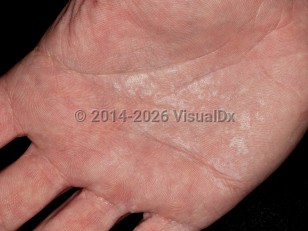This rare acquired condition has a higher prevalence among patients with cystic fibrosis (CF) and CF carriers. It presents most commonly in the second and third decades, and in females.
Drug-induced cases have been reported, including aspirin, celecoxib, rofecoxib, and tobramycin.
While the etiology is unclear, an increased water-binding capacity of stratum corneum due to its high salt content, or the high salt content of sweat, is a possibility. The CFTR gene, which is mutated in CF and CF carriers, encodes a chloride ion channel that governs the movement of chloride and sodium across epithelial membranes. In the skin, the mutated CFTR results in a higher concentration of sodium in the sweat.
APPK has many different names, including:
- Aquagenic wrinkling of the palms
- Transient reactive papulotranslucent acrokeratoderma
- Aquagenic syringeal keratoderma
- Transient aquagenic palmar hyperwrinkling
- Acquired aquagenic papulotranslucent acrokeratoderma



